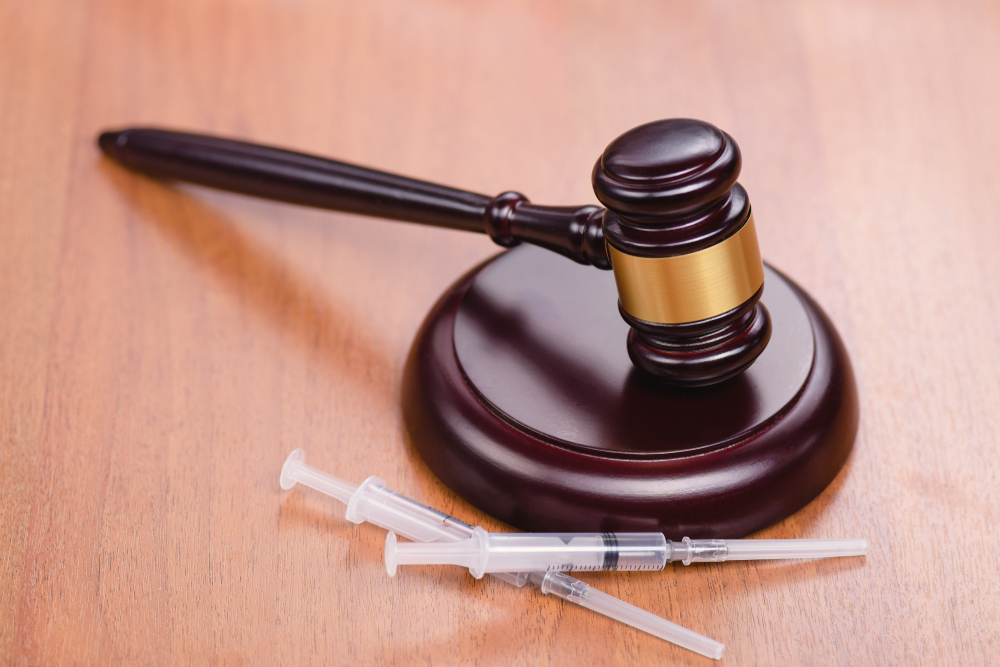Agriculture is the most storied industry in Georgia, and to this day, it remains one of the largest. From the first days of its founding, Georgia has been a farming state, and agriculture brings in more than $70 billion to the state’s economy.
About one in seven Georgia residents works in farming, which is a big reason why many people across the state may be concerned about their exposure to the potentially dangerous weedkiller, “Roundup.”
Roundup, which is also known by the name of its active ingredient, glyphosate, is at the heart of more than 100,000 lawsuits across the country that allege that the herbicide causes cancer. So far, three juries have agreed, and awarded plaintiffs more than $2 billion combined in damages.
A settlement offer is on the table that would end most of the lawsuits, and a separate offer has been proposed to set aside funds for future cases. What should Georgia residents who used or were exposed to Roundup and glyphosate know about this chemical and what legal rights they may have to seek compensation if they were harmed by it?
What Does Roundup Do?
Not long after it was introduced to the market in 1974, Roundup became a blockbuster product thanks to how effective it is at killing weeds. But the first use for glyphosate, which is Roundup’s active ingredient, wasn’t as an herbicide at all. Rather, until a Monsanto scientist discovered it could kill plants, glyphosate had been used to de-scale pipes, boilers, and other commercial plumbing equipment.
The secret to Roundup’s success is that it prevents plants from producing an enzyme that makes growth possible. Monsanto, which was acquired by the German pharmaceutical company Bayer in 2018, has consistently argued that it is not possible for Roundup to harm people, because the enzyme it targets in plants does not exist in humans.
Over the product’s lifetime, Roundup has become the best-selling weedkiller in history, and one analysis found that considering its agricultural, commercial, and residential uses, more than 3.5 billion pounds of glyphosate have been used in the United States since 1974.
In Georgia agriculture, glyphosate is mostly used to control weeds in the production of cotton, and Georgia farmers also use it for producing corn, soybeans, and peaches, though to a lesser extent. Estimates from the U.S. Geological Survey (USGS) indicate that since 1992, more than 51 million pounds of glyphosate have been used on Georgia farm fields and orchards.
Glyphosate Usage in Georgia
- Since 1992, nearly 51 million pounds of glyphosate have been applied to Georgia farm fields.
- Georgia ranks No. 24 nationally for glyphosate use in agriculture (2.9 million pounds in 2017, the most recent year for available data).
- Glyphosate is the third most commonly used herbicide or pesticide in Georgia agriculture, behind only dichloropropene and chlorothalonil, which are commonly used in peanut production.
- Cotton accounted for about 70% of the glyphosate used in Georgia farming in 2017, while corn accounted for 15%, and soybeans added another 5%.
- An estimated 2.4 million bales of cotton were produced in Georgia in 2020, second only to Texas (6.1 million bales). The state also ranked 24th for corn production (69 million bushels) and 28th for soybean production (4 million bushels).
Is Roundup Dangerous?
Roundup remains in wide use largely because the U.S. Environmental Protection Agency has determined several times over the past few decades that glyphosate is not a carcinogen. However, this is far from a consensus position, and researchers, regulators, and juries have all indicated that Roundup does cause cancer.
Even the EPA itself at one time held a similar view. In the mid-1980s, an EPA panel determined that glyphosate could have carcinogenic potential, but the agency reversed course in the early 1990s and has listed the chemical as probably not a cause of cancer since then.
However, consider that:
- Three juries have awarded more than $2 billion to four people who used Roundup and were later diagnosed with non-Hodgkin lymphoma. While the award amounts have been reduced on appeal, the jury members’ finding that the product causes cancer have not been reversed.
- The International Agency for Cancer Risk, an arm of the World Health Organization, lists glyphosate as a probable carcinogen, as does the California Office of Environmental Health Hazard Assessment.
- Glyphosate is banned in many places around the world, including Mexico, Vietnam, Luxembourg, and Thailand. German lawmakers are considering a rule that would phase out use of glyphosate for farming by 2024.
- The state of New York has passed but not yet implemented a ban on glyphosate use on state property.
- A study published by the University of Washington found that Roundup exposure increased the risk of developing non-Hodgkin lymphoma by as much as 40%.
Roundup and Non-Hodgkin Lymphoma (NHL)
Georgia residents who used Roundup or were exposed to it should know the physical signs of non-Hodgkin lymphoma (NHL), which is the type of cancer suffered by all plaintiffs who have received verdicts in their favor.
Symptoms vary by person, but these are the most common signs to watch for:
- Chills
- Fever
- Cough
- Fatigue
- Chest pain
- Weight loss
- Shortness of breath
- Swollen lymph nodes
- Swollen abdomen
- Other swelling
- Easy bruising
- Frequent, severe infections
- Night sweats
According to data from the American Cancer Society, NHL accounts for about 4% of cancer cases in a typical year, which makes it unusual, but not exceedingly rare. The agency projects that in 2021, about 82,000 people in the U.S. will be diagnosed and that 21,000 people will lose their lives because of it.
As is common with most types of cancer, early detection is crucial to survival. In fact, when caught early, NHL has a five-year survival rate of 73%, but this drops to 57% if it’s not detected until after it has spread throughout the body.
If you show any of the above symptoms and believe that you may have developed NHL as a result of exposure to Roundup, you should immediately seek medical treatment.
What Is the Current Status of Roundup Litigation?
To date, three Roundup cancer trials have gone before juries, and each of them have ended up with verdicts in favor of the plaintiffs. Members of these juries have been so convinced of the connection between glyphosate and cancer —as well as the alleged corporate malfeasance that has kept the product on the market despite its risks— that they have awarded a combined total of more than $2 billion in compensatory and punitive damages.
In all cases, award amounts have been slashed upon appeal, but the verdicts themselves have held up. Many observers believe it is the fact that Roundup lost in three consecutive trials that put pressure on Bayer, the company that now owns Monsanto, to issue a settlement offer, which the German drugmaker did in 2020.
Bayer has proposed setting aside $10 billion to end most of the 100,000 cases it is facing over Roundup and non-Hodgkin lymphoma, and as much as $2 billion for any future cases. Neither of these settlement offers have been approved, though negotiations are ongoing.
Labelling Settlement
A separate class-action case over the labeling of Roundup has seen a $40 million settlement be approved in most states, including Georgia. In that case, consumers could receive up to $90 each if they purchased Roundup because its label indicated that it could not cause harm to humans or pets because the plant enzyme it attacks is not present in mammals. This applies to Georgia consumers who purchased Roundup after Feb. 13, 2015.
How Much Can I Get From a Roundup Lawsuit in Georgia?
None of the plaintiffs in the successful Roundup trials have received the awards that juries and judges have said they are entitled to, and since settlement negotiations are ongoing, it is difficult to say with any certainty how much a person could receive from a Roundup lawsuit here in Georgia.
However, we can take some instruction from the preliminary guidelines Bayer proposed when it suggested its $10 billion settlement offer. The average payout was estimated at about $165,000, with some people receiving more and others receiving less.
A variety of stipulations will apply to the $10 billion settlement and the $2 billion set aside for future cases, if either are approved, and these are subject to change as negotiations continue. But here is a look at what has been proposed so far:
- The only people eligible to receive settlement money are U.S. citizens who were diagnosed with non-Hodgkin lymphoma and used Roundup for at least one year before they were diagnosed, or survivors of people to whom this applies.
- A person’s age at diagnosis and the stage of their cancer when detected will be factors in awarding points.
- The highest number of points will be awarded to survivors of Roundup victims who have died.
- Some survivors would have points reduced if the deceased died before 2009 and had no surviving spouse or juvenile children at the time of their death.
What Should I Do if I Have Been Affected by Roundup?
If you are a resident of Georgia who uses Roundup for any reason, whether or not it is part of your job, you should consider stopping use of the weedkiller. In addition to watching out for the symptoms of non-Hodgkin lymphoma that we shared before, you could consult with your physician to be sure.
For Georgia residents who used Roundup and were later diagnosed with cancer, while there is a settlement offer on the table, these cases are far from over, and the best way to make sure that you will be able to get the compensation to which you are entitled is to consult with an expert class-action law firm in Georgia. We can help connect you with a specialized firm in your area.
Given Georgia’s rich agricultural history, many law firms and attorneys in the state are well-versed in cases like those currently surrounding Roundup weedkiller. In most cases, you will not have to pay legal fees unless you win your case. Consultations are usually free, so there is no harm in seeking guidance.





